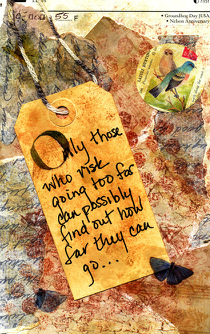| So, last time I mentioned that there was a way to bring the characteristics and qualities of your favorite fictional characters into your real life. Today, I'll discuss how you do that. This is the fun part! The first thing we need to do is know who we're working with. A note of caution: Please don't use this exercise to sort through trauma memories, unless you have the support of a therapist or someone you trust completely! This exercise is not meant for processing PTSD or other trauma. Let's start by picking out the fictional character that you most admire and that you feel like you most relate to. If you can't decide on one, pick a second, but don't pick more than two - it will get difficult to analyze more than two characters at a time. If you want to go back and do this exercise later with another character, you can do that but it's really best to stick to one at a time if you can. Next, spend some time thinking about the character. What do you like best about this character, in terms of their identity or personality? Keep these qualities in mind as you answer the following questions. I've attached a handy worksheet for you if you prefer to work that way. |
|
0 Comments
I thought for a while about whether or not I wanted to write about this, because there are so many armchair psychologists who are ready to explain and point fingers in regard to Robin Williams' suicide. Today, however, after hearing some of my clients' reactions and after hearing some of the things said in the media about it, I feel that I have something to say that might be helpful.
Mr. Williams' struggles with depression and addiction are well-known, and it's very easy to point fingers and say, "that was what did it." I've heard variations on that theme all day, most of them said with the attitude that nothing could help it. One radio host even went as far as to say, "He was beyond help. He was too far gone." I nearly had to pull my car off the road after hearing that, because I was so angry. I work all day with people who struggle with those feelings and with the pain and hopelessness that goes along with them. To hear a DJ blithely blame the victim was nearly too much for me. NO ONE IS "BEYOND HELP;" AND NO ONE IS "TOO FAR GONE." I can't emphasize that enough. In my work, one of the hardest things I face is letting a client know that it’s time move on. There are many reasons for ending therapy, and I’m going to explain some of them so you can see how complex the decision can be. I’ll start with a couple of reasons why clients end therapy.
Unfortunately, there is a lot of confusion about coaching and what it is, especially in regard to how it's different from counseling or therapy. One common - and wrong - distinction I hear a lot is that counselors work with people who are struggling with problems or mental illness, and coaches work with people are healthy. I need to say this clearly - this is NOT true! Even trained mental health professionals buy into this false distinction. Another thing I hear a lot is that coaches set measurable goals and counselors' goals are less well-defined. Again, simply not true. There are many, many other misconceptions, and I hope to clear up these and a few others in this post. Let's talk about the first misconception. It's half true - coaches do work with people who are not experiencing emotional difficulties or mental illness. They are not trained to do so, and are not licensed or supervised in doing so. However, the other half - that counselors don't work with those who are healthy - is simply not true. The reality is that counselor's and psychologist's training makes them very qualified and trained to do coaching. Dr. Michael Bader, a licensed psychologist, points out that: The biggest difference between coaching and therapy, in my view, is that the theory that guides my work as a therapist can explain how coaching does or does not work, while theories that guide coaches can't do the same about therapy. (http://www.psychologytoday.com/blog/what-is-he-thinking/200904/the-difference-between-coaching-and-therapy-is-greatly-overstated) Another, similar distinction is that therapists and counselors work with the past, and coaches work with the future. Again, this simplistic division simply isn't true. Let me give you an example. In the therapy I do, Dialectical Behavior Therapy (DBT), we focus specifically on how to manage situations that are likely to happen in the future. While I do sometimes explore the past in terms of how it affects my client's current level of functioning when it's relevant, the work I do specifically involves working toward making a better future. Cogntive behavioral therapy in general has this orientation. It''s simply untrue that counselors don't focus on the future. The second misconception - that coaches set measurable, time-limited goals and therapists don't - again, simply is not true. Therapy works best if client and therapist work together to set exactly these kind of goals. That's how we measure progress. Many therapists I know will assess their client's sense of whether or not they are achieving their goals every session or every few sessions. Tied into this misconception is the idea that therapy is long-term and coaching is not. Again - many good systems of therapy (solution-focused therapy for example) work best with a time-limited model. Many coaches like to point to specialized training they have worked on. As a psychologist, I very much appreciate the effort these coaches have made to educate themselves and work in an ethical manner. Professionals like these are a credit to their profession. However, coaching as a whole has not licensure, certification or even educational requirements. There is no professionally agreed upon code of ethics. Because of this lack of centralized standards and ethical principles, engaging a coach is a risk. Please don't get me wrong - there are many, many wonderful, trained and ethical coaches out there. There are also some great training programs out there. The International Coaching Federation has made an effort to create a code of ethics and implement standardized training. I think this is a wonderful start. However: The ICF has no authority to implement these standards to the field as a whole. There are no licensing requirements. I hope that will change in the future, and believe that it will. Until then, however, there is a wide range of traininig programs ranging from in-depth programs requiring supervision to simple online classes with no practice component. At this point in time, they can all claim to be "coach training programs" with equal legal standing. The fact of the matter is that counselors and psychologists are highly trained. They have engaged in in-depth coursework, practicum and internship experiences during which they get real-life experience, and supervision. They are licensed, and regulated by licensing boards and codes of ethics. Because of these safeguards, there is more consistency and safety for you, the consumer. So, let's get at the issue of how this works. Coaching is focused on helping you identify and make movement toward reaching your goals. So is therapy. Coaches are trained (ideally, but not necessarily) in helping you set and achieve these goals, through specific techniques including targeted and open questions, activities, and developing insight. Counselors and psychologists can do this too. The truth of the matter is that a trained and licensed counselor can do anything and everything that a coach can do. Coaches, however, are not able to do everything a counselor or psychologist can do. Coach trainer Barbara Silva said: As a coach trainer this is an issue I discuss quite a bit with my students. The biggest difference as I see it is that a therapist may address both coaching and therapeutic issues whereas the coach must remain within the coaching realm, staying away from clinical issues. From the client's point of view, it's more about their perspective on the kind of assistance they need. The last misconception I want to address is one that I have to admit bugs me because it strikes at the heart of my work. I read a lot that coaching is a wellness model, while therapy is a treatment. Reality: Many, many therapists (myself included) adopt a wellness model. Focusing only on the negative and on how to fix what is wrong does not help over the long term. Focusing on wellness, and healing, and health is an important aspect of therapy.
So, the bottom line is that really is not much of a difference except training. (I know that there may be coaches that take issue with this, but the evidence is pretty clear.) Therapists and psychologists can do anything and everything a coach can do, because they are trained, they work with wellness as well as problems, and they use many of the same techniques, methods, and models. If you are interested in working with a coach, check out the International Coaching Federation for their training and ethical guidelines: http://www.coachfederation.org. They are an excellent resource, and can refer you to well-trained and ethical coaches. If you are interested in working with a psychologist or counselor, ask them if they do coaching - many do! As Always: Please Note: The content on this blog is intended for informational purposes only. This is not therapy, and if you wish to work in therapy, please contact your local mental health agency or your physician for a referral. If you are in crisis or danger, please call 911 for immediate help. Please, again, realize that seeking out help really IS a sign of strength and not a sign of weakness. You don’t have to be alone in facing these things – there are people who care and who will help. Email me at: [email protected] © 2014 Dr. Laura Burlingame-Lee, Ph.D.  In my attempt to turn the mood around here a bit, I thought I'd write about one of my favorite wellness tools: Journaling. I have to start by saying that my definition of what makes a "journal" is pretty broad - for years I kept a copy paper box full of file folders with inspiring articles, pictures, quotes - and my comments on them. That, for a while, was my "journal." My bottom line in terms what constitutes a "journal" is that it's anything you want it to be. If you call it a "journal," then in my book, it's a journal. Period. There are way too many things in our lives and our worlds that end up being judged - the last thing we need judged is our creative and psychological expressions. Make it whatever you want it to be! Today, my journals tend to be a little more traditional, but that doesn't mean that I don't branch out on occasion. I usued to keep a "creative journal" which used to be a page-a-day appointment book - I used the pages as something on which to mount my creative expressions. I've been feeling "blocked" creatively for the last couple of months, so there hasn't been anything new to add, but I'm hoping that I'll let loose with a barrage of visual creativity here soon. I also keep a "regular" journal in one of those cheap composition books that you can buy in the grocery store. This is really my therapeutic journal. When I have trouble thinking straight or am feeling overwhelmed, this is the spot where it all comes out. For me, my creative journal is my "public" journal - if anyone sees it, it's not that big of a deal (after all, I posted pictures of it - how picky can I be?). My "regular" journal is a different story, though. This is the private stuff. When I'm really having a tough time coping, I get this out and write until I can't write anymore. If you're going to do this kind of writing, make sure you feel safe, or that you have some safety to do it. You may want or need to hide, lock up, or keep your journal in a place you feel is safe. I'm not kidding about that either - once I was so overwhelmed and feeling so down that I wrote for nine straight pages! I've found that there are some incredible books and systems for journaling - my advice would be to do what works for you. That's an important point, because there's a perception that there are a lot of rules to follow, like you should write every day, or write for a certain amount of time or a certain number of pages. It's really important to do what works for YOU. Forget the rules, and forget the shoulds. Let yourself play, too - this can be fun as well as insightful! I don't put any pressure on myself to write every day, or to write about a certain topic - my journal is MY expression. If you're the kind of person who thinks journaling would help you, I would encourage you to do this - again, do what works for you. Some people have spent lots of money and taken lots of courses on certain systems, like the Progoff system. Others, myself included, buy tons of books on writing and journaling. Other people simply just do it. Some people keep one journal and work through one book at a time. Other people have three or four going at once. The point here is that this is a tool to help you cope, to help you feel better, and to help you deal with the world around you in a healthy way. It's a tool to help you get to know yourself, and to have a safe place to vent, let off steam, ponder deep thoughts, record your history - whatever you want to make it. This is not the only tool, by far - but it is a very helpful one. The hard thing is that I see so many people start this, and then quit because they think they are "not doing it right" or read something that makes them feel they are "not good enough." Frankly, as a journal-ist AND as a mental health professional, I can honestly tell you that there IS no one, right or true way to do this. Anything you do here IS good enough, because it's an expression of who you are, where you are in your life, and what you're dealing with. And if it helps you cope and feel better - as well as be a better person, than it is good enough, right enough, and healthy. If it appeals to you, look up journal prompts, or join a site with an ongoing journal support group. One of my projects that I have going is writing an e-book of journal prompts. I'm excited about it, and hope to offer it in time for the new year. Whatever you do, do what works. It's effective, and it's healthy. Please Note: The content on this blog is intended for informational purposes only. This is not therapy, and if you wish to work in therapy, please contact your local mental health agency or your physician for a referral. If you are in crisis or danger, please call 911 for immediate help. Please, again, realize that seeking out help really IS a sign of strength and not a sign of weakness. You don’t have to be alone in facing these things – there are people who care and who will help. Email me at: [email protected] This has been a busy year so far. I've studied for (and passed) the EPPP, psychology's licensing exam, I've finished my supervision hours, and I've done what seems like endless amounts of paperwork. This last week was no different, except that there were more than a usual amount of clinical issues to be documented. I've put in several 11-hour days this week, and I need a break. SO...I'm taking one.
When I work with clients, I'm always encouraging people to be gentle with themselves and to take care of themselves. That doesn't mean not being accountable for your actions, by the way - it does mean if you have to take yourself to task you can do it in a way that's kind and gentle. One of my friends recently talked about how the Golden Rule also means treating yourself the way you'd want to be treated. If you'll notice, the Golden Rule doesn't say, "Treat others as you treat yourself," but rather "as you'd want to be treated." So, why do we have so much trouble treating OURSELVES the way we'd want to be treated? How often do we find ourselves chronically putting our needs last? Or ignoring our bodies' needs for rest and relaxation? How often do we take care of everyone else, leaving no time to do so for ourselves? For women, especially, it's a chronic issue. For parents, it's a necessity a lot of the time. For students, workers...the list of situations in which we put our own care last is nearly endless. When I work with people who chronically ignore or negate their own needs I used what I call "Healthy Selfishness." I use this term for a couple of reasons. One is that "selfishness" has been a label thrown at many us since we were small children, and it has such a negative connotation that reclaiming the word in a different way helps people see that it's NOT a bad thing to take care of themselves. That's the "Healthy" piece. It's healthy to care for ourselves, and to let ourselves enjoy life and things we enjoy. So, last night and today I spent some time playing. My kids like to get air-dry clay, so I made some beads that I will paint and varnish when they're dry. I got out my sketchbook and brainstormed ideas for fun things I want to do in my practice and in my life. I worked a little on a scrapbook of the cruise I went on with my mother. Tonight, I plan on watching a TV show, maybe reading a book or magazine, and (hopefully) going to bed early. Somewhere along the way to being a "responsible adult," I lost all that. I was always the "responsible child" so losing play happened pretty early for me. Today, I find myself yearning to let go, to play, to let loose - and I don't know how. So...I'm going to the best teachers I know - my children. I do have things I "should" do - I should work more on the business side of my job, I should work more on updating the paperwork for my private practice...AND I also should relax, take care of myself and treat myself the way I'd want to be treated. I should also not judge myself as harshly and punitively as I do. I should treat myself gently, respectfully, and lovingly. And that means paying attention to my need to relax, play, and cut loose a little. So, I'm going to attempt more play. I'm going to get my kids to teach me how to make things, like clay representations of the heads on Mt. Rushmore, or how to properly have a combination tea/art party. These are the things that make life rich - and I plan to take a break from being an adult for a while. If you can, I encourage you to find the time and do it yourself. As Always: Please Note: The content on this blog is intended for informational purposes only. This is not therapy, and if you wish to work in therapy, please contact your local mental health agency or your physician for a referral. If you are in crisis or danger, please call 911 for immediate help. Please, again, realize that seeking out help really IS a sign of strength and not a sign of weakness. You don’t have to be alone in facing these things – there are people who care and who will help. Email me at: [email protected] Have you ever noticed how kids act up and get into trouble when they're forced to be in a small space for a long period of time? It might (or might not) surprise you, but we "big people" are pretty much the same. These thoughts occurred to me last summer as we drove from our home in Colorado to visit my mom in Utah and from there to visit my husband's folks in Idaho
Now my kids are generally pretty good travelers, and we bring lots for them to do. I found that *I* got pretty cranky though, and felt antsy when I couldn't move a lot. Psychologically, we're like that too - when our minds and spirits are "cooped up," we tend to get irritable, cranky, and antsy. "Cooped up" is obviously not a psychological or clinical term, but it's good for how we feel when we can't be ourselves - we're mentally and emotionally locked in a room that we can't leave for a variety of reasons. Maybe we're a little eccentric and people just don't understand us or think we're weird. Maybe the people and environment around us is toxic and it's not safe for us to be ourselves. Maybe we risk punishment in a variety of ways (ostracism, abuse, denigrating comments or discrimination) if we truly show who we are. My point is that we can't always be ourselves and that we suffer as a result. Our world doesn't tolerate diversity and difference very well - we seem to be the kind of being that has to learn the hard way that our behaviors toward those who are different are hurtful and cruel. Sometimes, we don't realize this until we experience it ourselves and our eyes are opened. Some people never realize it, and some people never experience or recognize what it's like to be different. As painful as some of the experiences are, I think that coming through and overcoming them makes us stronger, more compassionate and more willing to change our own behaviors. In short - we grow, and become better people for the growing. However, being emotionally and/or spiritually "cooped up" damages us while it happens. Part of being human is being able to express ourselves and who we are - it's what brings us joy and peace. Acceptance allows us to feel safe in sharing those soft vulnerable places where we let our humanity shine through. And being safe is crucial to being able to be who we are. When we're not safe, when we feel judged, or when we have to hide who we are, we wall off a part of ourselves that is crucial to being psychologically healthy. We lose the ability not just to play, but to grow, to thrive, to experience and fully immerse ourselves in joy and vitality. Over time, we become anxious, depressed, angry, lonely, and maybe even traumatized (especially if abuse - ongoing or not - is occurring or has occurred.) We find ourselves "just getting through" - we may have trouble even knowing how to cope in healthy ways. We start to lose respect for and acceptance of ourselves as worthy, beautiful and interesting people. We may become isolated. It's tough to see the beauty in everyday life when we're focused on surviving and making it through instead of on living and thriving. It's next to impossible to feel free when you're cooped up by yourself or others and are unable to even think of breaking out. We become afraid - not just of the what will happen if we be ourselves, but of the punishments that hurt us and break our spirits. Fear becomes the companion of everyday life rather than joy - and the cost is locking up and losing ourselves. I watch my children develop, and I really try to encourage them to be themselves, even if no one else understands.My son Aidan is different from other people, because he's on the autistic spectrum. Here's the thing - I celebrate those differences even as I worry about how he'll cope with being different once he's in school. My hope and goal, though, is that by showing him acceptance and by celebrating the things that make him unique - the things that make him Aidan - that he'll have the confidence to continue to be himself and have confidence in himself. I try to make his world safe and accepting while also showing him the realities of living in this world. We talk about how people are mean, and that it's ok to ignore that. It's ok to like "red balls" (marker balls), light poles, and power poles and not worry what other people think. I try to use all the "tools" in my "toolbox" to help not just my kids, but myself break through and let go. I'm not completely successful yet, but realizing that this is a process helps (and that's one of the tools, too!) I use my DBT skills, my mindfulness skills, and my art skills to work on this - and I encourage the same in my children. Together we are curious, and go on "adventures" to see what's out there. I learn so much from THEM, too - noticing small things and seeing the world from such a different place...drawing on the sidewalk, splattering paint, using big, wide strokes to paint the world...there is a lot to learn from children. We ALL need this kind of safety to grow. Without that safety, we may physically "grow up" - but inside there remains a scared, insecure side of ourselves that is "cooped up" and waiting to be able to run. Art therapists key into this when they encourage us to let go and play. The hard thing is that most of us don't know how to let go. Despite years of training, I include myself in this - even as I watch and encourage my children, I long to be able to release that side of myself. One of the projects I've been involved with for a couple of years is a self-esteem seminar through Project Self-Sufficiency. I'm lucky enough to have been one of the facilitators, and one of the things I loved to do during that time was take part in providing safe and sacred space for the participants to let go and be who they were. I'd love to work on a "Letting Yourself Go" workshop, where I provide a safe place for music, dance, art and quiet time, all with the idea of breaking out of feeling "cooped up" and letting out who we are inside. Just like children who get stuck in cars or planes or rooms or houses - we also get cooped up. We also need space, fresh air, play, safety, and love - and those things are not "extras" or "rewards" - they're basic human needs and if we didn't get them when we were little, let's work to have them now. Not just for ourselves - but for everyone. For the children who never get it, for the people we encounter everyday who are "cooped up" by jobs, bills, daily hassles, etc - we can ALL provide the breath of fresh air and just a little permission to let go. Take care and remember to play! As Always: Please Note: The content on this blog is intended for informational purposes only. This is not therapy, and if you wish to work in therapy, please contact your local mental health agency or your physician for a referral. If you are in crisis or danger, please call 911 for immediate help. Please, again, realize that seeking out help really IS a sign of strength and not a sign of weakness. You don’t have to be alone in facing these things – there are people who care and who will help. Email me at: [email protected] |
Need to find something? Search the blog:
Archives
August 2022
Categories
All
|





 RSS Feed
RSS Feed